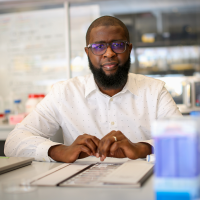Associate Professor of Biological Sciences; Principal Investigator at Columbia's Zuckerman Institute
Pain is a deeply personal experience.
Ishmail Abdus-Saboor studies how the sense of touch gives rise to pleasure and pain, with the aim of understanding how the brain reacts to what it experiences through the senses.
Read more about Ishmail Abdus-Saboor, PhD >
You walk into a hospital with a twisted ankle. The doctor asks, “How much pain are you currently experiencing, on a scale of 1 to ten?” It’s a surprisingly hard question to answer. Perhaps that’s because pain is so subjective.
“Pain is a deeply personal experience,” said Ishmail Abdus-Saboor, PhD, a principal investigator at Columbia’s Zuckerman Institute. “It’s also a very mysterious subject in neuroscience, one for which we currently have more questions than answers.”
Where, for instance, does chronic pain come from? Unlike the acute pain we feel when touching a hot stove, which warns us of danger, chronic pain that lingers long after an injury has healed seems to serve no evolutionary purpose – yet it afflicts tens of millions of people worldwide.
Dr. Abdus-Saboor, who played basketball in high school and knows a thing or two about injuries, is working to answer such questions. He’s investigating the biological basis of pain: how it shapes behavior and brain activity. The research is part of a larger program in his lab to understand how the brain reacts to what it experiences through the senses. While half of his lab members study pain (and pain's sibling, itch), the other half focus on pleasurable touch, such as the hug from a loved one that gives us a warm, fuzzy feeling.
In ongoing unpublished studies, his lab has discovered nerve cells in the skin of mice that respond to gentle touches during socially rewarding behaviors. Activating these cells makes a mouse behave as if it had been stroked. Disrupting these neurons, on the other hand, reduces a female’s tendency to engage in social behaviors, including sex. Without these cells the female mouse no longer finds social behavior rewarding and becomes aggressive towards sexual touch. Together, these studies demonstrate that touch neurons are just as critical for sexual behavior in rodents as olfactory and hormonal cues, and other circuits in the brain.
“These cells could be a clue in understanding people with autism, who often don’t like to be touched,” said Dr. Abdus-Saboor.
His work on pain began when, as a postdoctoral fellow, he invented a new way to measure pain in mice. It uses high-speed video cameras and machine learning to track and score changes in behavior. In his own lab, he developed an automated version of this platform. He’s building upon that work to conduct functional scans in search for signatures of chronic pain in the brain itself, in partnership with fellow Principal Investigator Itamar Kahn and the Zuckerman Institute’s Center for Theoretical Neuroscience.
Curiosity drives Dr. Abdus-Saboor: the same desire to solve difficult puzzles that spurred him to win his high school science fair as freshman, with a study of crayfish regeneration conducted on the third floor of his parent’s house in Philadelphia. But with family members suffering from chronic pain, his motivation to develop objective measurements that could one day improve care is also personal.
“Imagine if instead of asking you about your pain level, a doctor could use a camera or a scanner to detect it,” said Dr. Abdus-Saboor. “This has the potential to reduce biases and inequities in the healthcare system.”
Another strain of his research explores why the experience of pain may be different in different individuals. He has found that some mice are hypersensitive to pain compared to others. He’s searching for the reason behind this in their genes, with the idea that this could lead to new treatments for pain.
“We want to find an alternative to opioids, especially given the current epidemic,” said Dr. Abdus-Saboor. “We hope that exploring the genes and molecules underlying differences will reveal new non-addictive treatments that could alleviate suffering.”
Freeman Hrabowski Scholar (2023)
New Innovator Award (DP2)
Science Diversity Leadership Award
2022 Scholar in the Biomedical Sciences
Research Fellow
Award in Pain Scholar
Mitchell Max Award for Excellence in Pain Research
Elias LJ, Succi IK, Schaffler MD, Foster W, Gradwell MA, Bohic M, Fushiki A, Upadhyay A, Ejoh LL, Schwark R, Frazer R, Bistis B, Burke JE, Saltz V, Boyce JE, Jhumka A, Costa RM, Abraira VE,
Cell.2023 Feb 2
Toussaint AB, Foster W, Jones JM, Kaufmann S, Wachira M, Hughes R, Bongiovanni AR, Famularo ST, Dunham BP, Schwark R, Karbalaei R, Dressler C, Bavley CC, Fried NT, Wimmer ME,
Sci Adv.2022 Feb 18
Jones JM, Foster W, Twomey CR, Burdge J, Ahmed OM, Pereira TD, Wojick JA, Corder G, Plotkin JB,
Elife.2020 Aug 6
Abdus-Saboor I, Fried NT, Lay M, Burdge J, Swanson K, Fischer R, Jones J, Dong P, Cai W, Guo X, Tao YX, Bethea J, Ma M, Dong X, Ding L, Luo W
Cell Rep.2019 Aug 6
Olson W, , Cui L, Burdge J, Raabe T, Ma M, Luo W
Elife.2017 Oct 12
Cui L, Miao X, Liang L, , Olson W, Fleming MS, Ma M, Tao YX, Luo W
Neuron.2016 Sep 7